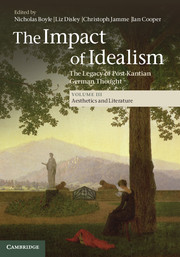Book contents
- Frontmatter
- Contents
- List of Illustrations
- List of Contributors
- Acknowledgements
- List of Abbreviations
- Introduction: Idealism in aesthetics and literature
- 1 The legacy of Idealism and the rise of academic aesthetics
- 2 Hegel's philosophical theory of action: the concept of action in Hegel's practical philosophy and aesthetics
- 3 Tragedy and the human image: German Idealism's legacy for theory and practice
- 4 Romanticism as literary Idealism, or: a 200-year-old way of talking about literature
- 5 Idealism in nineteenth-century German literature
- 6 Idealism in nineteenth-century British and American literature
- 7 Elements of Schopenhauer's thought in Beckett
- 8 German Idealism and the philosophy of music
- 9 The music of German Idealism
- 10 ‘Refiner of all human relations’: Karl Friedrich Schinkel as an Idealist theorist
- 11 Influences of German Idealism on nineteenth-century architectural theory: Schelling and Leo von Klenze
- 12 ‘Making a world’: the impact of Idealism on museum formation in mid-nineteenth-century Massachusetts
- 13 Hegel, Danto and the ‘end of art’
- Bibliography
- Index
- References
5 - Idealism in nineteenth-century German literature
Published online by Cambridge University Press: 05 December 2013
- Frontmatter
- Contents
- List of Illustrations
- List of Contributors
- Acknowledgements
- List of Abbreviations
- Introduction: Idealism in aesthetics and literature
- 1 The legacy of Idealism and the rise of academic aesthetics
- 2 Hegel's philosophical theory of action: the concept of action in Hegel's practical philosophy and aesthetics
- 3 Tragedy and the human image: German Idealism's legacy for theory and practice
- 4 Romanticism as literary Idealism, or: a 200-year-old way of talking about literature
- 5 Idealism in nineteenth-century German literature
- 6 Idealism in nineteenth-century British and American literature
- 7 Elements of Schopenhauer's thought in Beckett
- 8 German Idealism and the philosophy of music
- 9 The music of German Idealism
- 10 ‘Refiner of all human relations’: Karl Friedrich Schinkel as an Idealist theorist
- 11 Influences of German Idealism on nineteenth-century architectural theory: Schelling and Leo von Klenze
- 12 ‘Making a world’: the impact of Idealism on museum formation in mid-nineteenth-century Massachusetts
- 13 Hegel, Danto and the ‘end of art’
- Bibliography
- Index
- References
Summary
Post-Kantian Idealism is not only the defining force in nineteenth-century German philosophy, but also the major intellectual current giving shape to nineteenth-century German literature. Its significance in both realms is owed to the long trajectory – encompassing both development and rejection – inspired by its most systematic representative: the speculative absolute Idealism of Hegel. This was the point of departure for a lineage in German philosophy which sought variously to modify and fundamentally to challenge Hegel, by replacing his dialectical, or ‘spiritual’, terms with material processes and, in the later nineteenth century, by insisting on the primacy of will. Hegel's revolutionary development of Kant's own revolution (his ‘post-Kantianism in a new vein’), and the long-term philosophical reaction it engendered, are also the source of the most compelling historical connections to be drawn between many of Germany's most significant literary figures of the nineteenth century. One reason for this is that the themes of Hegel's thought in the broadest sense – that is, not simply (or even primarily) of that part of it which is concerned with literature – touch directly on those of literary writing, in seemingly disparate modes, from Friedrich Hölderlin to Thomas Mann. In the first major document of speculative Idealism, Phenomenology of Spirit (Phänomenologie des Geistes, 1807), Hegel's account of self-consciousness develops patterns familiar from his earlier, theological, association with Hölderlin, and combines these with an analysis of social being that has subterranean links with the conceptual foundations of European realism, and so, beyond any theory Hegel himself could give of the genre, to the novel. German poetry, prose fiction and drama of the nineteenth century repeatedly intersect with, and respond to, the intellectual tradition that Hegel initiated, and in which these two related aspects of the speculative achievement – its religious inheritance and its realistic potential – enter into deep tensions.
- Type
- Chapter
- Information
- The Impact of IdealismThe Legacy of Post-Kantian German Thought, pp. 92 - 120Publisher: Cambridge University PressPrint publication year: 2013



